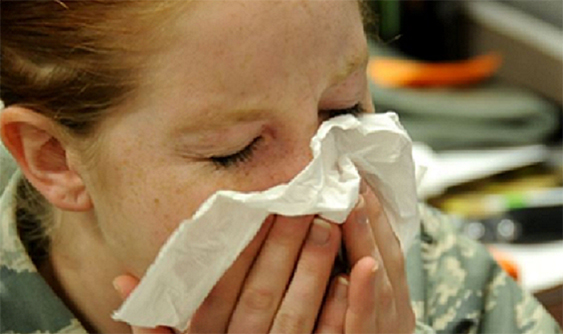
(Photo: Airman 1st Class Kenna Jackson/US Air Force/Creative Common)
As we enter into the colder months we also enter into the coughs and colds seasons. Whilst pharmacies are stocked with many different products that claim to treat all the different symptoms related to colds, there is not always robust clinical evidence that they work as well as they claim to.
A recent article in the British Medical Journal (BMJ) has looked at some of the over the counter (OTC) treatments and reviewed what remedies actually offer some benefit.
The common cold is caused by viruses and whilst the symptoms can make you feel quite miserable they are usually limited from a few days to a week before you see signs of improvement.
However, more severe symptoms can mean days off school or work, children, in particular, are more likely to get colds; suffering from around 6-8 colds per year compared to adults who average around 2 to 3. So what remedies will actually offer some relief?
One of the typical symptoms of a cold is a runny nose and/or nasal congestion.
Reporting in the BMJ, a team of clinicians reviewed the effectiveness of treatments for the common cold by reviewing previously published medical trials and reports. They concluded that evidence for the effectiveness of many OTC treatments is limited and of low quality, and clear guidance is lacking; in particular there is little evidence for their use in children.
They reported that the use of decongestants in adults had a small effect on nasal symptoms, by reducing the swelling of blood vessels in the nose allowing the airways to open a bit, but their effect is limited. However, decongestants are not suitable for children under 12 years.
The BMJ study also looked at other popular home remedies such as humidified steam, echinacea, eucalyptus oil and reported that there is little or no evidence for their effectiveness and they have either not been studied in children, or aren’t effective.
The study concludes that there is ‘no magic bullet’ when it comes to treating the symptoms of the common cold but some forms of treatment may offer some help to alleviate symptoms.
Another recent report on cough syrups at the University of Basel also reported that many OTC coughs medicines were not that effective in treating symptoms. Writing in the British Journal of General Practice, the scientists conducting the study assessed many different cough syrups on patients who were suffering from a cough lasting between 3 to 8 weeks.
It was concluded that overall, all of the studies’ participants saw their symptoms improve regardless of whether they took medication or not and that no cough medicine speeds up a patient’s recovery or eases the severity of their symptoms.
Furthermore, according to NHS UK, there is little evidence that supplements such as Vitamin C, Zinc or Garlic prevent colds or speed up recovery.
So, what do we do when we get a cold? One piece of advice is to try to avoid catching one in the first place – which can be difficult given that colds are caused by viruses that are easily spread between people.
Simple measures like washing your hands can help and also if anyone has a cold, sneeze/ a cough/blow your nose into a tissue and then bin the tissue to prevent the spread of the germs. This is particularly important to teach children as they are the most likely family members to bring a cold into the house.
Once you have a cold the advice is to drink plenty of fluids, keep warm and rest. Paracetamol and ibuprofen can help with headaches, temperatures and muscle aches and to help you feel more comfortable. Some decongestants might offer some relief in adults.
For children saline, nasal irrigations or drops can be used safely, but may only offer limited relief. Vapour rub may also relieve congestion (but can cause skin irritation in some cases). Hot drinks such as honey and lemon may offer some help.
New proposed guidelines from the National Institute for Health and Care Excellence and Public Health England earlier this year stated there is some limited evidence that honey can help improve cough symptoms, with patients being advised to use hot honey and lemon drinks or OTC cough syrups and wait for symptoms to improve on their own, before going to a GP.
In general, it seems that the common cold is something we will all suffer from at some point and there is no ‘magic bullet’ that will get rid of those annoying symptoms like a runny nose and cough. Some medicines will offer some relief but it seems that many won’t offer you much more help than a hot honey and lemon drink.
However, in 2016 the results of a large independent study found that patients taking a chocolate-based cough medicine had a significant improvement in symptoms within two days – faster than other remedies. This isn’t the only evidence that chocolate (or cocoa) can help with coughs.
The exact mechanism of action isn’t known yet, one theory is that the thickness of the chocolate helps the active ingredients of the cough syrup stick to the lining of the throat for longer, or it could be an ingredient in chocolate that helps – whatever the reason it’s certainly an ingredient most people would like added to their medicine – we can but hope.
The good news is a cold usually clears up on its own and most coughs will improve on their own within two to three weeks. Ask your pharmacist or doctor for advice if the symptoms are not going away or get worse, or you are concerned about an illness.
Rachel Kayani